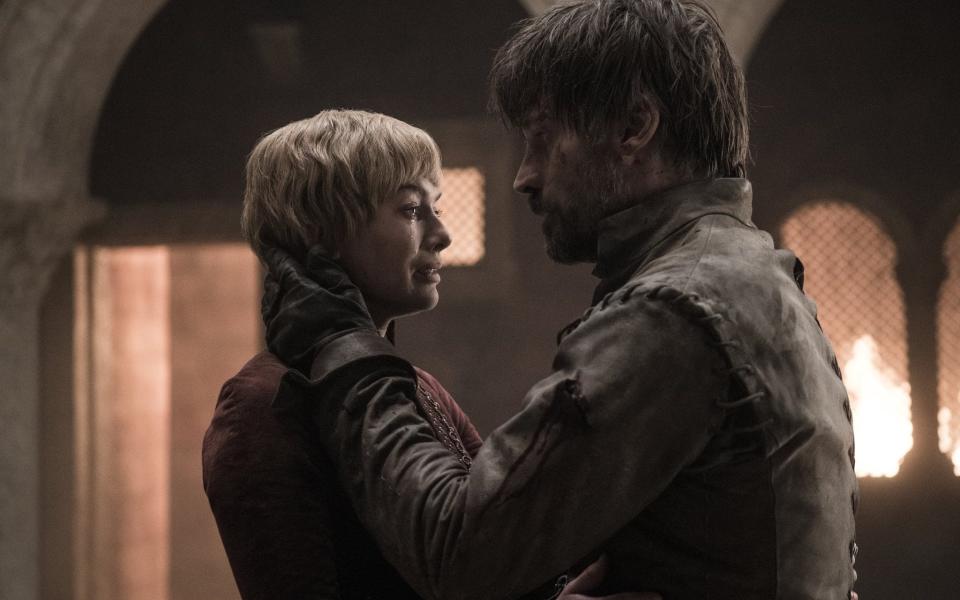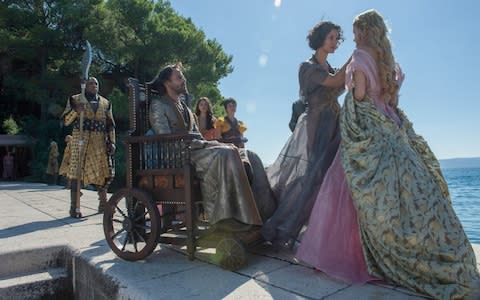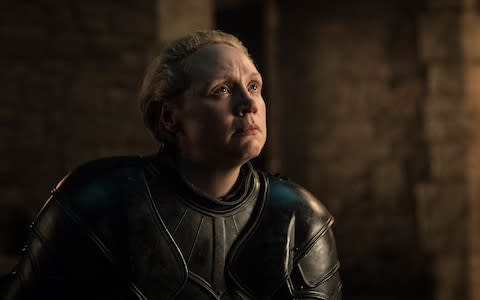Dismayed, disappointed, divided: how the Game of Thrones cast really feel about the final season

Early in March 2015, shortly before Game of Thrones returned for its fifth season, David Benioff sat at a table in the Oxford Union’s 200 year-old debating chambers, trying to repress a smirk.
He was flanked by stars Kit Harington (Jon Snow) and John Bradley (Samwell Tarley) and fellow showrunner DB Weiss. They’d been on stage some 70 minutes discussing the series and taking questions from the floor. Now, with the hour late, a woman near the front asked if actors ever protested upon learning their Game of Thrones character was to be killed off.
“Before we deliver the scripts…we make a phonecall,” said Benioff, smiling. “Usually people are quite gracious. This year, for the first time, we got some pushback. 'Are you sure?'. And we said, 'yeah…we’re quite sure you are going to die this year.' There was a long conversation and we [received] a long letter explaining this was a bad idea, which just made us want to kill that person much more.”
Benioff tried not to laugh. But his relish was unmistakable. He didn’t identify the ticked-off thesp. It later emerged that it was the veteran Belfast actor Ian McElhinney, who had been hugely discombobulated to discover his character, Ser Barristan Selmy, was to die in a bloody ambush.
His unhappiness wasn’t simply a matter of professional pride or careerism. McElhinney was well established on stage and screen and did not lack for employment opportunities (he currently plays the deadpan grandad in Channel 4’s Derry Girls). What irked him was that, in the George RR Martin novels, of which he is a fan, Ser Barristan is very much alive and at the side of his queen, Daenerys Targaryen.
“I gave some arguments of my own why I thought Barristan was kind of important in Daenerys’s story, important enough that he should stay in Daenerys story, and he didn’t,” McElhinney would tell the Huffington Post.
“It proves you should probably not read the books. I’ve read the books,” he said in another interview. “So I thought this season I was going to have more to do, and I was really looking forward to that. And then I got my dates from my agent and I thought, 'That doesn’t tally.'”
Game of Thrones was at the time on its way to becoming the world’s most popular television show. McElhinney’s protests, along with Benioff’s sneery counterpunch at the Oxford Union, were easily ignored (George RR Martin has, by contrast, disputed a recent claim by McElhinney that the final two volumes in A Song Of Ice and Fire are complete and being held back until the series concludes).
Yet now, as viewers stagger away from what is generally agreed to be a crushingly inept final season, his protestations have taken on the aspect of something Benioff and Weiss evidently know very little about: foreshadowing.
Further bad-mouthing was to follow. Twelve months after McElhinney went down fighting another former Game of Thrones actor, Alexander Siddig (aka Star Trek: Deep Space Nine’s Doctor Julian Bashir) gave a bruising “exit interview”. This after his character, Dornish ruler Doran Martell, was abruptly snuffed out after being brought back at the start of season six.

“There was an enormous amount of fan excitement when I got named to be on the show, and everyone was like, 'Oh my god, yes, Doran Martell. He’s going to be great as Doran Martell',” Siddig told startrek.com .
“That might have been the kiss of death. Maybe they didn’t want quite that much attention on that character. Maybe they thought, “Well, let’s prove that we’re going to stray from the books. We’re going to do something else, and he will be our first example of that.” Or maybe I just screwed up. Maybe I said the wrong thing to the wrong person.”
As with McElhinney, this was in the moment perceived as a disgruntled actor hanging out their dirty laundry. Three years later, with Game of Thrones going down in flames, it is becoming clear, however, that even better known cast members have issues with how Benioff and Weiss have steered the show since running out of books to adapt.
“I am having sleepless nights about the whole thing, I really am,” Kit Harington told red carpet reporters at Thrones’s European premiere in Belfast last month. “The last two nights I have slept really badly because I am just a worrier.”
The red carpet is where actors go to smile and say nothing of consequence. Harington, however, came across as genuinely concerned about the direction Benioff and Weiss had taken.
“I am a real worrier and there is a lot of pressure on this. I really hope we have done something that most of the people that follow this show – you cannot please everyone – that people will love. So I am nervous, but I am excited for people to see it.”

With just one episode remaining, his misgivings are surely vindicated. Jon Snow has essentially been written out of his own story. The Bastard of Winterfell was built up as the resurrected warrior fated to battle the Night King. But then cheeky Arya Stark popped up to do the job for him (as Jon cowered from a dragon in the forecourt).
Arya killing the Night King was contentious even with the actress who plays her, Maisie Williams. “I immediately thought that everybody would hate it; that Arya doesn’t deserve it,” said Williams, though she ultimately concluded that the expectations-subverting twist was an example of what Game of Thrones does best.
“The hardest thing is in any series is when you build up a villain that’s so impossible to defeat and then you defeat them. It has to be intelligently done because otherwise people are like, ‘Well, [the villain] couldn’t have been that bad when some 100-pound girl comes in and stabs him.’ You gotta make it cool. And then I told my boyfriend and he was like, “Mmm, should be Jon though really, shouldn’t it?””
The Arya bombshell pales, of course, compared to the handbrake turn Game of Thrones has pulled with Daenerys Targaryen (Emilia Clarke). She went full “Mad Queen” in the most recent episode, whipped into a cataclysmic frenzy…by the chiming of bells.

As one of Thrones’s biggest stars Clarke was never going to publicly bad-mouth Benioff and Weiss. Nonetheless, as with Harington, her unease over the path taken by the saga is unmistakable.
“It f___ed me up,” she told Vanity Fair when asked about Daenerys’s “arc” in season eight. “Knowing that is going to be a lasting flavour in someone’s mouth of what Daenerys is...”
She also gave a deeply strange interview on the red carpet of HBO’s Emmy party last September. It has now resurfaced as disgruntlement over series eight spreads like dragon fire rippling across a medieval skyline.
“Best season ever,” Clarke said, her eyes a little too narrow, voice a little too high pitched. Was she trying to tell us this was actually going to be the worst season ever? A similar ambivalence could be detected in an interview to camera in which Peter Dinklage (Tyrion Lannister) allowed his voice to drain of emotion as he declared, “There are no better writers in television than Dan Weiss and David Benioff.”
“You people are in for it,” he added. It sounded more like a warning than a recommendation.
Actors with less stellar profiles have been able to speak more freely. After his character, Varys, was torched by Drogon following his clunking attempt to betray Daenerys this week, Conleth Hill didn’t hold back.
“In a way, [Varys’s significance] was lost when we got past [George R.R. Martin’s] books,” he said. “That special niche interest in weirdos wasn’t as effective as it had been. Last season and this season there were great scenes and then I’d come in and kind of give a weather report at the end of them — “film at 11.” So I thought he was losing his knowledge.
“If he was such an intelligent man and he had such resources, how come he didn’t know about things? That added to my dismay.”
Another freshly departed star, Nathalie Emmanuel (Missandei), likewise expressed misgivings regarding her recent treatment on screen. "I really had wished that I had more time or scenes this season maybe with Daenerys or even with Cersei, scenes where we get to see her being brilliant before she dies," she said.

"I think that might have eased the pain a bit more for people, and reinforcing a friendship that she and Dany had because we haven't really seen anything for a few seasons, but I think she's so fiercely loyal to Dany, and I think she was until the bitter end, and it's almost fitting for Missandei really, in a way."
Nor have actors been blind to the fact that, as Benioff and Weiss left Martin’s material behind, so the show grew more reliant on spectacle.
“Character development?” blurted out Joe Dempsey (Gendry) when asked about the arc of King Robert’s illegitimate heir in season seven. “Nah…[it’s all about] story… I really need to shut up.”
A further hint of dissatisfaction was dropped by Nikolaj Coster-Waldau, aka Jaime Lannister. The show, in its later seasons, was moving at an increasingly breakneck pace – with little room for the slow exposition that was a hallmark of its earlier years, he said.
“We’re used to having a whole season to get to a point. Now suddenly, a lot of things happen very quickly,” he admitted to Vanity Fair. “There’s so many things that obviously you can’t go through, on-screen, all of these moments, but you have to still walk through them in your mind, if you’re an actor, at least talk about them. There was a lot of those connecting the dots throughout.”
Jaime’s story concluded with the Kingslayer transforming into a heartbreaker. He abandoned Brienne of Tarth, his road buddy-turned-lover, to be with his toxic twin Cersei. Gwendoline Christie, who acted opposite Coster-Waldau as Brienne, confessed that she found the character’s descent into heartbroken soppiness – she weeps as Jaime leaves her – “difficult to comprehend”.
“We all have our own ideas about how we think the character is going to develop,” she said. “Sometimes your ideas become set in your mind, and sometimes David and Dan write something you didn't expect.
"This character has been very impactful in my life and in the way I think about women and in the way they're portrayed in the media and the way they're treated in society. [Playing Brienne] has challenged many of my beliefs and has been really resonant. So there were some things I didn't expect.

“If there's a character you care about and you feel like they go through some sort of hell, you feel protective toward them. Also, because of the modern world you live in, you're aware of how other people react to the character. There's a feeling of wanting to honour the character and also to bring her to life."
Even much-disparaged Euron Greyjoy himself – aka Danish actor Pilaou Asbæk – seemed a bit miffed at how it had all gone down. When a fan asked on Twitter about the divergence between the two-dimensional evil Captain Jack Sparrow from the show and George RR Martin’s far scarier, quasi-supernatural Euron, he appeared to agree that the novels’s vision of the character might have worked better.
“I know I divided the audience,” he later told IndieWire. “Some people love it. Some people hate it.”
As we count down to the weekend and the last ever episode of Game of Thrones, it is possible, of course, that the viewer backlash is misguided. Perhaps the series will, at the death, justify its many shocks and switchbacks. That is certainly one of two plausible outcomes, as Kit Harington said in a recent interview. Asked to sum up the end of Thrones he hedged his bets. “Disappointing… no epic… one of those.”

 Yahoo News
Yahoo News 